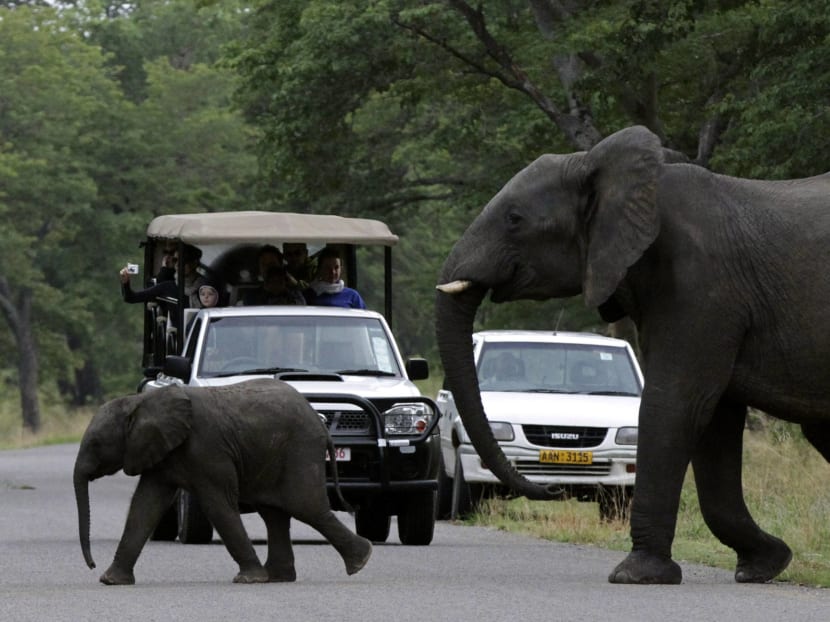Elephants for sale as Zimbabwe’s biggest park left without funds
HARARE — Zimbabwe is considering the sale of as many as 62 live elephants to China, France and the United Arab Emirates because Hwange National Park, the country’s biggest game reserve, isn’t receiving adequate state funding.

Visitors look on as an elephant and calf cross a road inside Zimbabwe's Hwange National Park. Photo: Reuters
HARARE — Zimbabwe is considering the sale of as many as 62 live elephants to China, France and the United Arab Emirates because Hwange National Park, the country’s biggest game reserve, isn’t receiving adequate state funding.
Elephants can be sold for between US$40,000 (S$52,955) and US$60,000 (S$79,432) each, depending on age, and the revenue could help meet the US$2.3 million annual running costs of the park in the northwest of the country, Director for Conservation at the Zimbabwe Parks and Wildlife Authorities, Mr Geoffreys Matipano, said in an interview at Hwange.
“We are pursuing it aggressively as part of conservation efforts because we have plenty of elephants here,” Mr Matipano said. “We don’t receive state funding and we rely on selling animals for our day to day operations, we are nowhere near what we want.”
The size of Zimbabwe’s economy has halved since 2000, according to the government, after the seizure of commercial farms for redistribution to subsistence farmers slashed exports and triggered a near-decade long recession. Funding for services such as national parks has dried up along with the money needed for the maintenance of infrastructure such as roads and water supplies.
While African elephants are considered endangered, with about 470,000 left in the wild in 37 countries, about 300,000 of them live in the southern African nations of Namibia, Botswana, Zimbabwe and South Africa, according to the African Wildlife Foundation.
CONNECTICUT SIZE
Population control options have been limited by public opposition to culling, a method last used in Zimbabwe in 1998, with contraception and translocation considered expensive.
Between 1960 and 1998, 46,000 elephants were culled in Hwange, Lovelater Sebele, the park’s resident ecologist, said.
At 14,651sqkm, about the size of Connecticut, Hwange has 43,000 elephants against a carrying capacity of 15,000, Mr Matipano said. Water is supplied for the animals through 80 bore hole pumps that use solar power or diesel to pump the groundwater to the surface at an annual cost of US$500,000. Elephants can drink 200 litres of water each a day.
“Obviously, these huge numbers puts pressure on us on how to manage them and also how to conserve the environment,” Mr Matipano said. “It’s a costly exercise to have these animals at one single place, because we spend a lot of money to provide the water for the animals.”
ENCLOSED ELEPHANTS
Prior to shipment the elephants would be rounded up and kept in an enclosure for three weeks before being shipped by cargo plane to their destination.
“The biggest issue is how they will be treated once they reach their destination,” said Mr Andrew Taylor, a spokesman for the Johannesburg-based Endangered Wildlife Trust. “How will they be housed, what will they be used for, will they be kept in tiny enclosures?”
Buyers from the UAE are seeking 15 elephants, China 27 and France 15 to 20, Mr Matipano said. Some could be sent to private zoos after their ability to keep the animals is assessed by the Zimbabwean wildlife authorities.
“Transporting elephants long distances is feasible but it requires very experienced vets to keep them sedated for long periods,” Mr Taylor said. “There are health risks associated with sedation for an extended period of time.”
South African buyers have applied to acquire buffaloes and sable antelopes, Mr Matipano said.
Funds raised will also be used to finance anti-poaching activities with the park currently having one ranger per 100sqkm rather than the recommended 20sqkm, Mr Trumber Jura, Hwange National Park manager, said.
Last year 293 elephants were lost to poachers using cyanide poisoning, and this year 139 have been killed, Mr Matipano said. In clashes with rangers 29 local poachers were shot dead last year while 12 poachers, all Zambians, were killed this year, Mr Jura said. BLOOMBERG






